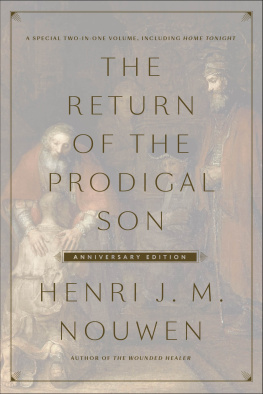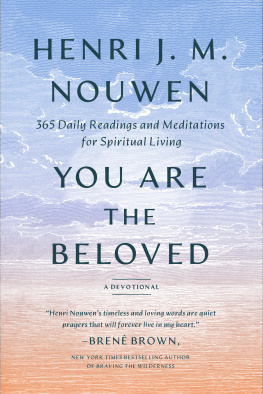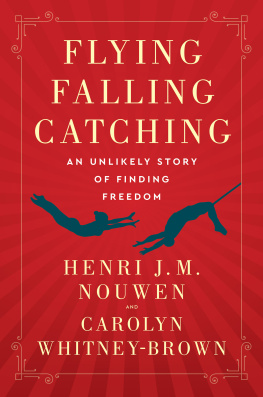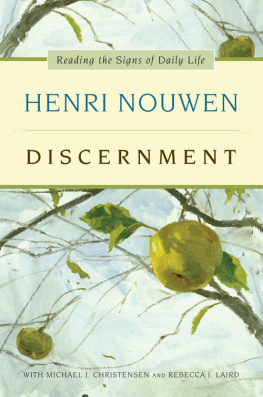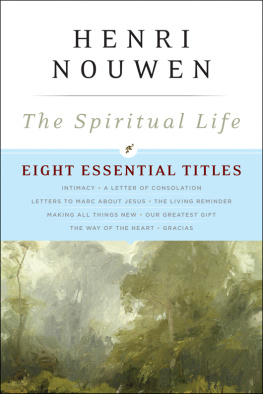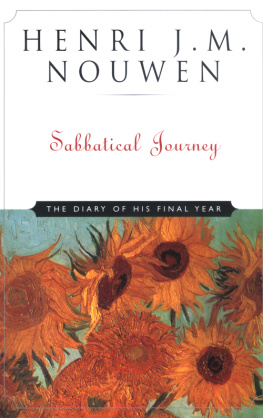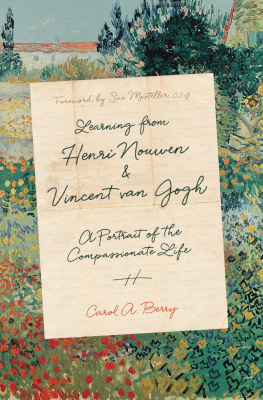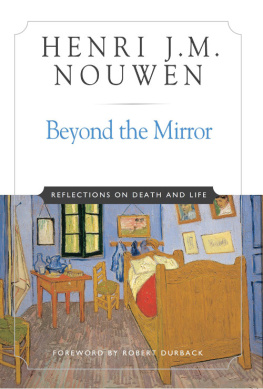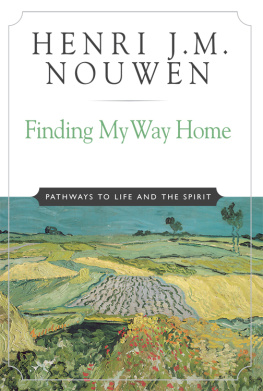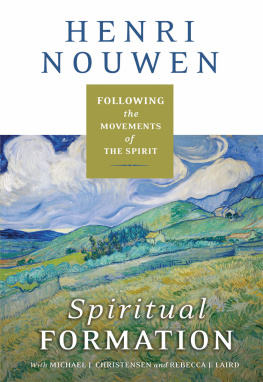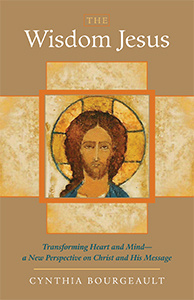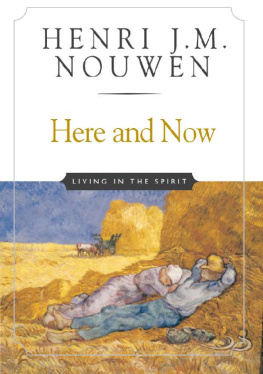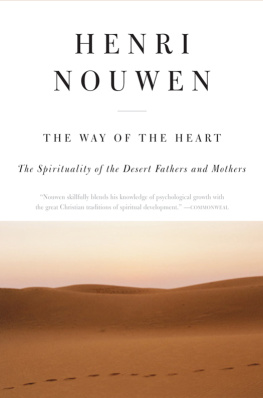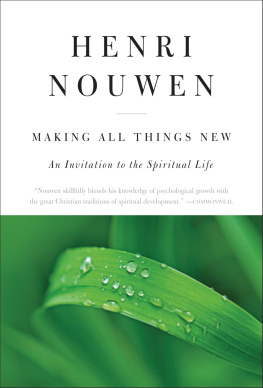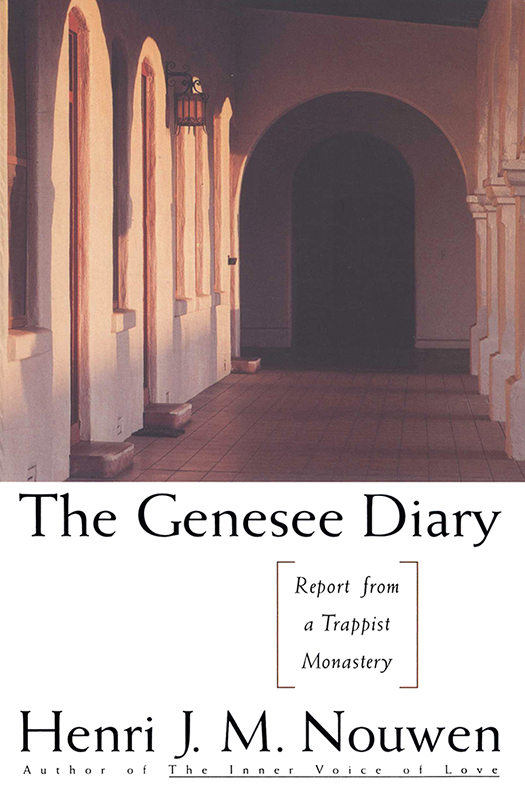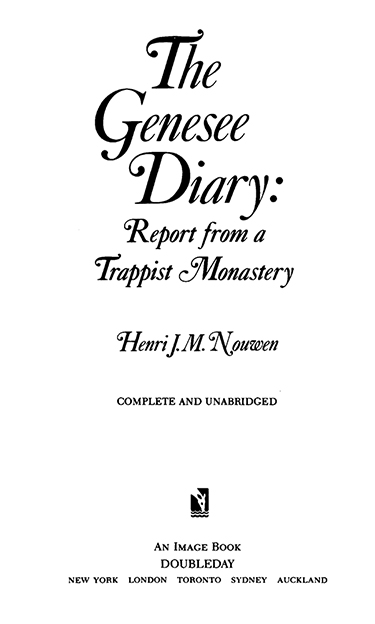About the Book
This is an extraordinary account of a man seeking inner peace and total commitment to God. a fine portrait of cloistered life, a beautifully written account of one mans soul-searching.
Publishers Weekly
a unique and personal document. What emerges is the baring of a very gifted writers soul. Nouwens devastating frankness in his soul-searching is a great aid in helping the reader identify with him as he opens his soul to his spiritual master.
Bro. Patrick Hart in America
Reading this book is a wonderful experience. The Genesee Diary is a superb report about joy and God and Henri Nouwen. The power of Nouwens diary lies in its capacity to shatter such favorite illusions and return them to us in truer form.
Cross Currents
This unsparingly honest book is inspirational in the best sense. It inspires confidence in the author; it inspires one to imitation without false expectation; it inspires trust in ancient ways of judgment and prayer which the trend think to be outmoded. And it is packed with comments, descriptions, and incidents which are delightful and instructive.
Our Sunday Visitor
For easygoing reflection and fresh insight into the monastic life, Nouwens diary is tops. He records his moods and observations during seven months as a temporary Trappist and leaves us with a realistic look at the power and grace of the monastic vocationa vocation which does not solve all problems in our life, but helps one to praise God with new vigor. Nouwen emerges with a new strength to deal with the human condition, and we can profit from his pilgrimage.
The Christian Century
The Genesee Diary, by Henri J. M. Nouwen, is a positively superior item.
The Church World
Nouwens depiction of life at the monasterythe regimen of work, prayer, and liturgy; the significance of the abbot and the monastic brotherhoodprovides a valuable account of contemporary Trappist life in America. His unusually candid personal reflections, which range from the merely commonplace to the perceptive, constitute the other dimension of the book. The Genesee Diary owes much of its growing popularity to the Mertonian quality of its more illuminating passages and to the fresh yet traditional nature of its message.
Religious Studies Review
The Genesee Diary is far and away one of the most rewarding books I have read in years, because it so beautifully lifts the heart and mind to God and the Savior.
Christianity Today
Other Henri J. M. Nouwen titles from Doubleday
AGING
COMPASSION
CREATIVE MINISTRY
THE INNER VOICE OF LOVE
LIFESIGNS
REACHING OUT
THE RETURN OF THE PRODIGAL SON
THE ROAD TO DAYBREAK
THE WOUNDED HEALER
A N I MAGE B OOK
PUBLISHED BY DOUBLEDAY
a division of Bantam Doubleday Dell Publishing Group, Inc.
1540 Broadway, New York, New York 10036
I MAGE , D OUBLEDAY , and the portrayal of a deer drinking
from a stream are trademarks of Doubleday, a division of
Bantam Doubleday Dell Publishing Group, Inc.
First Image edition published March 1981
by special arrangement with Doubleday, a division of
Bantam Doubleday Dell Publishing Group, Inc.
This Image edition first published December 1989.
Acknowledgments for permission to quote from copyrighted
sources will be found on .
Library of Congress Cataloging-in-Publication Data
Nouwen, Henri J.M.
The Genesee diary.
Complete and unabridged.
Includes bibliographical references.
1. Nouwen, Henri J. M. 2. Spiritual lifeCatholic author. I.Title.
[BX4705.N87A33 1981] 248.4 80-23632
eBook ISBN: 978-0-8041-5208-2
Copyright 1976 by Henri J. M. Nouwen
ALL RIGHTS RESERVED
v3.1
To all contemplative men and women
who by their commitment to unceasing
prayer offer us hope in the midst
of a troubled world.
ACKNOWLEDGMENTS
Many friends have helped me make the decision to publish this diary. I want to express my deep gratitude to Ellie Drury, Louis Dupr, Bob Lifton, Mu-Gak, Eric Olson, Colin Williams, Richard White, Arnold Wolf, and Phil Zaeder for the time and the attention they have given to the writings of which this diary is a selection. Without their encouragement, I would have never been able to follow through with the suggestion that my diary might be of interest to more than a small circle of friends.
I owe a special word of thanks to Dorothy Holman who was the first to make me think about the possibility of publication when she said, This is the most unselfconscious writing you have done. Maybe you should have it printed exactly because you didnt write it with that purpose in mind. That same unselfconsciousness, however, was the cause of many linguistic and stylistic weaknesses. I am very grateful to Stephen Leahy, Bob Werner, and John Mogabgab for the care with which they corrected the manuscript.
Finally, I want to express my appreciation for the editorial help of Bob Heller and the secretarial assistance of Pat Murray Kelly, Cyndy Halverson, Katie Hicks, and Claire Mattern.
CONTENTS
INTRODUCTION
My desire to live for seven months in a Trappist Monastery, not as a guest but as a monk, did not develop overnight. It was the outcome of many years of restless searching. While teaching, lecturing, and writing about the importance of solitude, inner freedom, and peace of mind, I kept stumbling over my own compulsions and illusions. What was driving me from one book to another, one place to another, one project to another? What made me think and talk about the reality of the Unseen with the seriousness of one who had seen all that is real? What was turning my vocation to be a witness to Gods love into a tiring job? These questions kept intruding themselves into my few unfilled moments and challenging me to face my restless self. Maybe I spoke more about God than with him. Maybe my writing about prayer kept me from a prayerful life. Maybe I was more concerned about the praise of men and women than the love of God. Maybe I was slowly becoming a prisoner of peoples expectations instead of a man liberated by divine promises. Maybe It was not all that clear, but I realized that I would only know by stepping back and allowing the hard questions to touch me even if they hurt. But stepping back was not so easy. I had succeeded in surrounding myself with so many classes to prepare, lectures to give, articles to finish, people to meet, phone calls to make, and letters to answer, that I had come quite close to believing that I was indispensible.
When I took a closer look at this I realized that I was caught in a web of strange paradoxes. While complaining about too many demands, I felt uneasy when none were made. While speaking about the burden of letter writing, an empty mailbox made me sad. While fretting about tiring lecture tours, I felt disappointed when there were no invitations. While speaking nostalgically about an empty desk, I feared the day on which that would come true. In short: while desiring to be alone, I was frightened of being left alone. The more I became aware of these paradoxes, the more I started to see how much I had indeed fallen in love with my own compulsions and illusions, and how much I needed to step back and wonder, Is there a quiet stream underneath the fluctuating affirmations and rejections of my little world? Is there a still point where my life is anchored and from which I can reach out with hope and courage and confidence?


